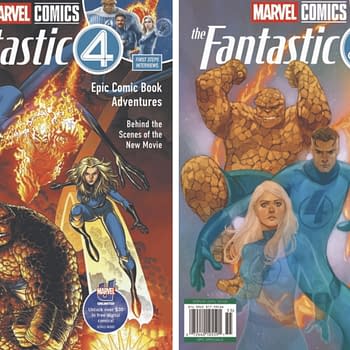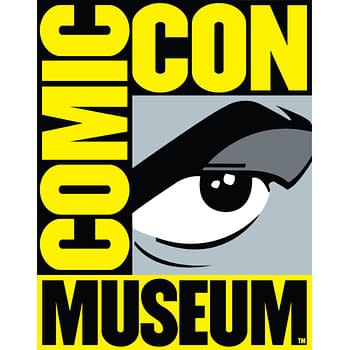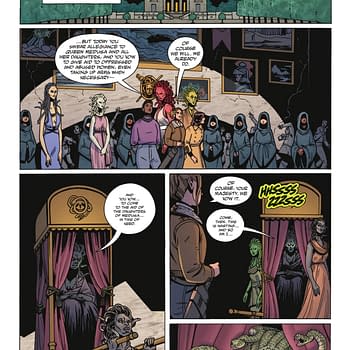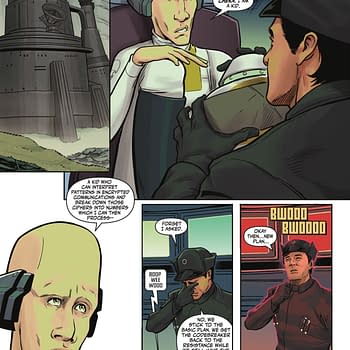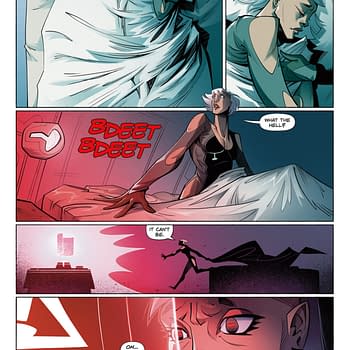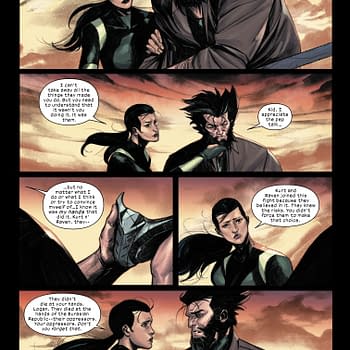Posted in: Comics | Tagged: brian k vaughan, comic con, Comics, Cory Doctorow, entertainment, new york, new york comic con, NYCC, saga
Brian K. Vaughan, Cory Doctorow, An FBI Agent And An Ex-Israeli Soldier Join Forces at NYCC
By Paul Gullas
Brian K. Vaughan stepped to the podium and gestured to his other panelists to cheers, "first of all, isn't this the most badass panel?". It would be a great TV show, he said. "An FBI agent, a former Israeli soldier, a book author, a bald guy, fighting crime together?".
It was Saturday evening at NYCC's "Breaking Good: Addressing World Challenges through Comic Books and Video Games" panel, and judging from the number of Saga cosplayers and autograph seekers in the room, much of the crowd had come to see the (bald) superstar comics & TV writer, but also left inspired by the work of everyone who spoke.
Moderated by Thomas Estler, each of the panelists discussed how they used their work in comics and video games to educate and change peoples' attitudes in fun and engaging ways
Estler began by describing comics' long history of promoting social values, from undercover journalist Stetson Kennedy using the Superman radio show to weaken the KKK, and the Golden Age Wonder Woman delivering empowering speeches, to the famous "black skins" speech from Denny O'Neil's Green Lantern/Green Arrow.
Estler then talked about Abolitionista!, the comic that he created to raise awareness about human trafficking. Since around 300,000 Americans are trafficked every year, with an average age of 12, he wanted to be able to reach this demographic before they could be victimized. He believes that the best way to protect children is to educate them, and his book teaches them to identify recruitment and who they can go to for help.
Children have responded to the book in droves, with some being able to quote the entire thing verbatim, because, he believes, a comic book doesn't seem like an educational tool, but more like entertainment.
Through his work, Estler met the next speaker, Alexis Krieger, victim specialist from the FBI's Newark, NJ office. She stressed that human sex trafficking doesn't just happen overseas, but within our own neighborhoods. She was impressed by Estler's passion and said that the comic could help kids understand what's happening before it's too late.
The next speaker was game developer Asi Burak, president of Games for Change. He compared the mainstream perception of video games today to the way comics were perceived in the 1940s & 50s: that at best, they're nothing more than pure entertainment and could never approach the heights of great film or literature.
But he thinks there is room in a $72B industry for games that have a social impact. He pointed out that maybe they need a new name for what they do in video games, like what the term "graphic novels" was for comics.
Burak then brought up 4 examples: Quest to Learn, a public middle/high school in NYC's Chelsea neighborhood, which has a curriculum inspired by game design and encourages learning via quest-based problem solving. Re-Mission is a game created by HopeLab aimed at cancer patients. Researches found that kids who played the game were much more consistent in taking their cancer drugs, listening to their doctors, and learning about their disease, than those who didn't play. He brought up the protein-folding game FoldIt, which received a lot of mainstream attention in 2011 when gamers built a protein model in 3 days, when scientists couldn't solve it in 15 years.
He finally came to his own game, PeaceMaker. After 5 years in the Israeli military, he came to the U.S. in 2004, and developed this game about being able to solve one of the most complex issues in world politics: the Israel/Palestine Middle East conflict. You can choose to be Israeli leader or Palestinian President, and he wanted Israeli kids to be able to play as a Palestinian, and vice-versa.
Bestselling author Cory Doctorow was up next. The founder of Boing Boing has just released his first graphic novel, In Real Life, adapted by Jen Wang from his short story Anda's Game. It's about a young woman who is recruited into an all-girl guild in an MMO, finds power & confidence in sisterhood, and is then hired to kill gold farmers within the game. Because they're cheaters, you see. But then she meets a union organizer in the game and starts to finds solidarity with the gold farmers.
Doctorow says that many people had told him that Anda's Game had changed their thinking about globalization and the way they understood Chinese-U.S. economic relations. The story covers topics as diverse as gender, body image, solidarity, class war, and race, and a graphic novel is the perfect way to teach kids about these complex issues because you can tell them a compelling story from the inside, instead of presenting them with dry economic language.
"Kids have it in their capacity to fight for justice," he said, mentioning kids being in the front lines in Hong Kong and Istanbul. "They're less compromised in their view of morals and justice," he explained. "We all start out with a real understanding that in an ideal world, we would do more for our fellow person," but as time ticks by, compromises become the new normal. "Kids don't have that stain yet."
Vaughan then brought up a New York Times article that mentioned that kids who read the Harry Potter novels become more tolerant, precisely because the categories are made-up, like Muggles and Mudbloods, and not overt real-life groups, which could prompt defensive or resistant reactions.
He joked to much laughter that unlike the other panelists, "I have done nothing to make the world a better place…I just write pervy space comics." He likened Saga to a Guantanamo Bay soldier falling in love with a captured Al-Qaeda fighter, but he didn't think enough people would have been able to make the connections that they do when he says "one has horns, one's got wings."
Pride of Baghdad was written to show the effects of war on non-combatants. If he were to explicitly write about Iraqi citizens, different readers would have different reactions. But writing about animals transcends race and creed. He mentions that propaganda materials are usually in cartoon form, and that political cartoons are more effective than op-ed pieces. "There's something about that combination of words and pictures, and that [readers] are the final collaborators when you read them, and that makes comics hit very hard."
He then ceded the rest of his time to Q&A. One woman said that she cofounded a company teaching middle schoolers how to code for game design. She asked Asi Burak for any tips and advice. He said that she deserves applause and that it's a very timely issue. He brought up #GamerGate and said that the best thing to do would be to lead the way for other women, because there's such a small number of female coders in the game industry. Having more women will change the content and diversity of games. Burak thanked her for her work.












